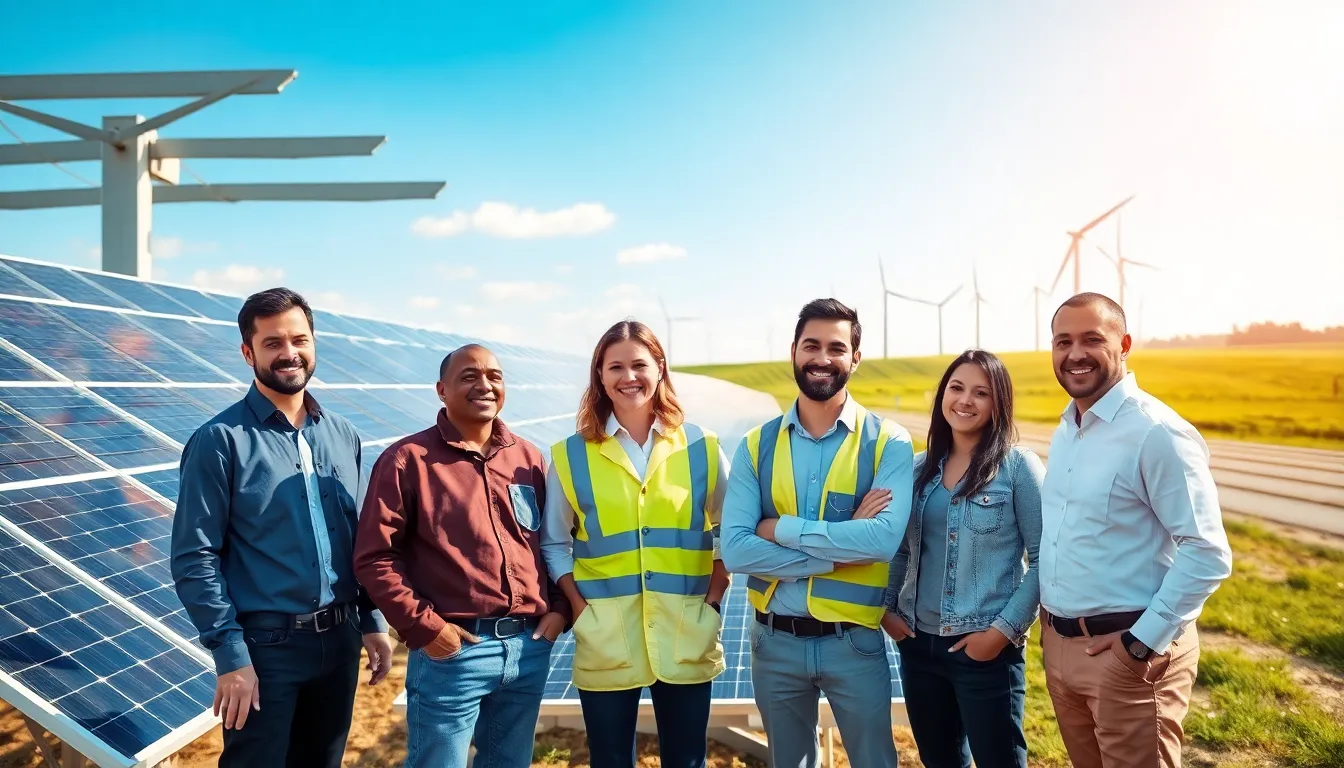In a world where climate change feels like the villain in a superhero movie, new sustainable technology is stepping up to save the day. Forget about capes and spandex; these innovations are the real game-changers, tackling environmental issues with a blend of brilliance and creativity. From energy-efficient gadgets to eco-friendly materials, the future’s looking greener than ever.
Imagine a world where your morning coffee is brewed with solar power and your car runs on recycled pizza boxes. Okay, maybe not pizza boxes, but you get the idea. As businesses and innovators race to develop solutions that benefit both the planet and our wallets, it’s time to dive into the exciting realm of sustainable tech. Buckle up; this journey might just make you laugh a little while inspiring you to think big about a greener future.
Table of Contents
ToggleOverview of New Sustainable Technology
Emerging sustainable technology proves essential in addressing climate change challenges. Innovations include energy-efficient gadgets that reduce consumption and carbon footprints. Solar panels equipped with advanced materials capture sunlight more effectively, increasing energy harnessing. Electric vehicles revolutionize transportation, offering reduced emissions and lower operating costs.
Recycling processes also evolve through technology, converting waste into valuable resources. Biodegradable materials feature new formulas that break down more efficiently than traditional plastics. Smart home devices enhance energy management, allowing users to monitor and reduce utility usage through real-time data.
Hydrogen fuel cells generate emissions-free energy for various applications, including public transportation. Geothermal energy systems tap into the Earth’s heat, providing reliable and renewable energy options. Artificial intelligence optimizes resource allocation and sustainability in agriculture, increasing yields while minimizing environmental impact.
Investment in sustainable technology grows, driven by increased awareness of ecological responsibilities. Many companies prioritize renewable energy sources, committing to ambitious sustainability goals. Collaboration between governments and businesses accelerates research and development, fostering innovation.
Incorporating these technologies encourages a paradigm shift towards greener practices. Implementing sustainable tech not only benefits the environment but also stimulates economic growth. Globally, countries adopt regulations supporting sustainability initiatives, fostering a united front against climate change.
With these advancements, everyday activities become more eco-friendly, shaping a future where sustainability is the norm rather than the exception.
Key Innovations in Sustainable Technology

Sustainable technology showcases significant advancements that promise a greener future. The following innovations highlight key areas of progress.
Renewable Energy Solutions
Solar energy continues to dominate the renewable sector. Advanced solar panels provide higher efficiency rates, generating more power in less space. Wind energy also gains traction; modern wind turbines capture wind efficiently, reducing reliance on fossil fuels. Hydropower systems harness river currents, supplying consistent and renewable energy. Organizations now invest heavily in these solutions, driven by both economic incentives and regulatory support. Some countries prioritize offshore wind farms, which offer vast potential for energy generation without significant land use. Innovations in energy storage technology, such as lithium-ion batteries, further enhance the effectiveness of renewable resources, making energy availability more reliable.
Waste Management Advancements
Innovations in waste management are transforming how societies address waste. Smart recycling systems utilize AI and machine learning to sort materials effectively, increasing recycling rates. These systems minimize contamination, which previously hindered recycling efforts. Composting technologies also advance, turning organic matter into nutrient-rich soil amendments. Moreover, industrial symbiosis creates networks where waste from one industry becomes a resource for another, fostering circular economy principles. Technologies for converting waste to energy provide additional solutions, creating usable energy from refuse that would otherwise end up in landfills. Many municipalities are adopting zero-waste strategies, aiming to significantly reduce landfill reliance, fostering a cleaner environment.
Impact on Environment and Society
Sustainable technology significantly influences both the environment and societal structures. Its implementation promotes a more efficient and responsible way of living.
Reduction of Carbon Footprint
Emerging technologies contribute to substantial carbon footprint reductions. Renewable energy systems like solar panels and wind turbines generate clean power, minimizing greenhouse gas emissions. Electric vehicles eliminate tailpipe emissions, directly impacting air quality in urban areas. Enhanced energy efficiency in homes leads to reduced energy consumption, making a positive environmental difference. According to a 2023 report, global carbon emissions could decrease by 70% with widespread adoption of sustainable tech. Individuals and businesses adopting these innovations create a collective movement against climate change.
Social Benefits of Sustainability
Sustainable technology fosters social benefits that extend beyond environmental advantages. Green jobs arise from investments in renewable resources and energy-efficient infrastructures. Economies experience growth as new industries develop, generating employment opportunities in areas like manufacturing and installation. Communities gain access to healthier environments, reducing health risks associated with pollution. Moreover, educational initiatives linked to sustainability raise awareness and inspire proactive participation. As a result, a sense of unity develops within communities working together toward a sustainable future. Data indicates that regions embracing sustainable innovations see improved quality of life and increased public health.
Challenges in Adoption
Adopting new sustainable technology presents multiple challenges that could hinder its integration into everyday life. Economic constraints and technological limitations are among the most significant obstacles.
Economic Barriers
High initial investment costs deter many businesses and consumers from transitioning to sustainable solutions. Budget constraints often limit the ability to purchase advanced solar panels or electric vehicles. Long-term savings do exist but might not appeal to those focused on immediate financial pressures. Some governments provide incentives or grants to mitigate costs, yet access to these resources may vary by region. Overall, the combination of upfront expenses and limited financial support complicates widespread adoption.
Technological Limitations
Technological capabilities currently lag behind the demand for innovative sustainable solutions. Energy storage systems sometimes struggle to match the efficiency needed for widespread adoption. Limitations in recycling technology also prevent effective waste management, hindering the shift to circular economies. Certain renewable energy technologies lack the necessary infrastructure for distribution, affecting accessibility in remote areas. Despite rapid advancements, these technological challenges impede the full realization of sustainable technology’s potential.
Future Trends in Sustainable Technology
Emerging trends in sustainable technology promise to transform various sectors. Significant advancements focus on energy efficiency, with solar power technologies increasingly becoming more efficient and affordable. Innovations in energy storage, particularly lithium-ion batteries, support the smooth integration of renewable energy sources.
Smart cities are gaining traction, utilizing interconnected systems to enhance resource management. These cities employ sensors and AI to optimize energy use and reduce waste, paving the way for eco-friendly urban environments. Notably, electric vehicle adoption expands rapidly as charging infrastructure improves alongside battery technology.
Biodegradable materials are evolving, presenting alternatives to conventional plastics. Companies innovate by developing synthetic compounds that break down naturally, decreasing environmental impact. The fashion and packaging industries are adopting these materials, significantly reducing corporate carbon footprints.
Waste management solutions are transforming as well. Smart recycling systems utilize AI for improved sorting accuracy, enhancing efficiency in recycling processes. Municipalities increasingly embrace zero-waste strategies, aiming for sustainability through community engagement and education.
Collaboration among stakeholders accelerates innovation. Governments, businesses, and research institutions unite, pooling resources to advance sustainable tech. This partnership creates a supportive ecosystem for rapid technology adoption, driving economic growth while addressing environmental challenges.
Future trends also include a rise in hydrogen fuel use. Hydrogen fuel cells offer clean energy alternatives, especially for transportation, producing only water vapor as a byproduct. This technology’s potential transforms industries, contributing to substantial reductions in greenhouse gas emissions.
Each of these innovations plays a crucial role in creating a sustainable future, addressing climate change, and promoting healthier living environments. Understanding these trends prepares individuals and organizations to engage in and support the shift towards a more sustainable economy.
The future of sustainable technology holds immense promise for transforming how society interacts with the environment. As innovations continue to emerge and evolve, they pave the way for a greener economy and healthier communities. The collaboration among governments, businesses, and researchers is vital for overcoming existing challenges and accelerating the adoption of these technologies.
By embracing sustainable solutions, individuals and organizations can contribute to a significant reduction in carbon footprints while enjoying the benefits of cleaner energy and improved resource management. As awareness grows and investment increases, the vision of a world powered by sustainable technology is becoming a reality, making it essential for everyone to engage in this critical transition. The path ahead is filled with opportunities for a brighter, more sustainable future.



